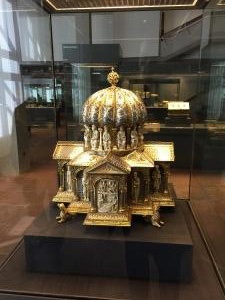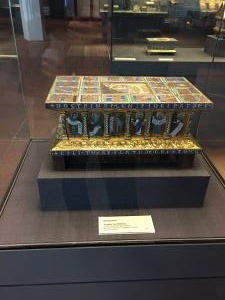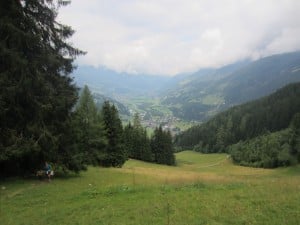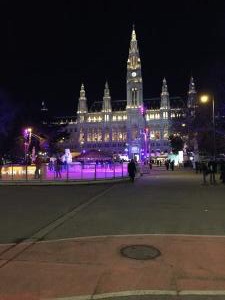Three New Members Are Added but German Museums Can Still Decline to Participate
After nearly a year of hinting at changes the Advisory Commission in Germany that makes recommendations to state museums on claims for allegedly Nazi-looted works in their collections (“Beratende Kommission im Zusammenhang mit der Rückgabe NS-verfolgungsbedingt entzogener Kulturgüter, insbesondere aus jüdischem Besitz,” or “Advisory Commission on the return of cultural property seized as a result of Nazi persecution, especially Jewish property”), the federal government announced last week the addition of three new members. Yet despite public outcry over the outdated and opaque procedures of the commission (better known as the Limbach Commission, in reference to the late Jutta Limbach, presiding member and former judge of the Constitutional Court), none of the fundamental flaws in the panel have been confronted or addressed. Instead, the occasion has served as little more than another photo opportunity for federal Minister of Culture Monika Grütters, whose visage dutifully accompanies all the recent announcements.
Read More
Topics:
Legislation,
Frankfurter Allgemeine Zeitung,
Stefan Koldehoff,
Beratende Kommission,
Gurlitt,
NS Raubkunst,
Restitution,
Bavarian State Paintings Collection,
Looted Art,
World War II,
Süddeutsche Zeitung,
Monika Grütters,
Limbach Commission,
Bayerische Staatsgemäldesammlungen,
Raphael Gross,
Gary Smith,
Marion Eckart-Hofer,
Simon Dubnow Institute,
American Academy in Berlin,
Rudiger Mahlo,
Jewish Claims Conference
Supposed Changes to German Advisory Commission on Nazi Looted Art Short on Specifics
There have been a number of articles this week indicating that Germany intends to reform the “Advisory Commission on the return of cultural property seized as a result of Nazi persecution, especially Jewish property” (Beratende Kommission im Zusammenhang mit der Rückgabe NS-verfolgungsbedingt entzogener Kulturgüter, insbesondere aus jüdischem Besitz) that is charged with making recommendations to German museums on claims for art allegedly looted or bought under duress during the Nazi era. Yet the most astonishing part of the news is that it is no news at all. It is merely a repetition—if that—of what was promised in March. Only now it is not even a promise, it is an indication that proposals may be forthcoming at some indefinite point in the future. It is further evidence that the entire endeavor does not deserve to be taken seriously. At best, the “reforms” would address some of the appalling discriminatory comments made earlier this year. But nothing proposed so far would compel a museum to submit to the commission, about which Bavaria in particular—the federal state that isin the midst of its own scandal for returning art to actual Nazis while giving heirs the runaround—notoriously refuses even to appear before the commission
Read More
Topics:
Alfred Flechtheim,
Germany,
Nazi-looted art,
Advisory Commission,
Gurlitt,
NS Raubkunst,
Restitution,
Bavaria,
World War II,
Limbach Commission
We filed yesterday the opposition to the motion to dismiss my clients’ claims over the 1935 forced sale of the Guelph Treasure, or Welfenschatz. The motion was filed two months ago by defendants Germany and the Stiftung Preussischer Kulturbesitz. As we noted when Germany first moved to dismiss the complaint last fall, Germany’s arguments were revisionist and alarming in a number of troubling ways, most seriously because they tried to excuse persecution of Jews before an arbitrary date as an internal affair not subject to U.S. court jurisdiction, and because it repudiated Germany’s international commitments under the Washington Principles to address restitution claims on the merits. The abject failure of the Advisory Commission, which Germany tries to portray here as some sort of arbitration (which it is not) is also at the fore.


Read More
Topics:
Nazi-looted art,
Foreign Sovereign Immunities Act,
Advisory Commission,
Beratende Kommission,
FSIA,
NS Raubkunst,
Restitution,
World War II,
Welfenschatz,
Limbach Commission
Barely a week ago German Minister of Culture Monika Grütters was dismissively rejecting any changes to the Advisory Commission that issues recommendations on claims of Nazi-looted art in German museums. Today, in a classic Friday afternoon news dump, Germany caved to a drumbeat of pressure to include Jewish members of the Commission, pressure that began right here and continued with the support of colleagues and friends around the world. The lesson? No voice is too small to make a difference.
Read More
Topics:
Germany,
Nazi-looted art,
Restitution,
World War II,
Monika Grütters,
Raubkunst,
Limbach Commission
Last week Germany’s Minister of Culture Monika Grütters made the astonishing statement that the Advisory Commission that issues recommendations for questions of allegedly Nazi-looted art in German museums would not be revised to include a member of the Jewish community because that Jewish member “would be the only voice who would be prejudiced.” The statement was not idle gossip, it was to the New York Times, which was writing a feature piece about her. This was a shockingly tone-deaf statement for a German cabinet member to make. Even in a vacuum, it is logically indefensible; why would a Jewish member be more biased than a German member (about which she had no objection). And, of course, it is not a vacuum—we are talking about Germany.
Read More
Topics:
Germany,
Nazi-looted art,
Gurlitt Collection,
Advisory Commission,
Restitution,
Monika Grütters,
Raubkunst,
Limbach Commission
Two days after suspending their participation in the Advisory Commission on the return of cultural property seized as a result of Nazi persecution, especially Jewish property, often called the "Limbach Commission" after its presiding member Jutta Limbach (the Beratende Kommission im Zusammenhang mit der Rückgabe NS-verfolgungsbedingt entzogenen Kulturguts, insbesondere aus jüdischem Besitz), the heirs of Alfred Flechtheim withdrew from the proceedings entirely. The dispute concerns Violon et encrier (Violin and Inkwell) (1913) by Juan Gris in the Stiftung Kunstsammlung Nordrhein-Westfalen (Art Collections Foundation of North Rhine-Westphalia) in Düsseldorf.
Read More
Topics:
Alfred Flechtheim,
Nazi-looted art,
Advisory Commission,
Beratende Kommission,
Restitution,
Düsseldorf,
World War II,
Limbach Commission,
Dr. Michael Hulton,
Juan Gris

In a move that is symbolic of the tattered legitimacy of the German Advisory Commission concerning Nazi-looted art in state museums, the heirs of famed and persecuted Jewish art dealer Alfred Flechtheim today suspended the state-run non-binding mediation process concerning Violon et encrier (Violin and Inkwell) (1913) by Juan Gris in the Stiftung Kunstsammlung Nordrhein Westfalen (Art Collections Foundation of Northern Rhineland/Westphalia) in Düsseldorf. Dr. Michael Hulton of San Francisco, California, Flechtheim’s great-nephew and heir instructed his attorneys to put on hold the Beratende Kommission im Zusammenhang mit der Rückgabe NS-verfolgungsbedingt entzogener Kulturguts, insbesondere aus jüdischem Besitz (Advisory Commission on the return of cultural property seized as a result of Nazi persecution, especially Jewish property, often called the Limbach Commission after its presiding member Jutta Limbach) after disputes about the fairness of the proceedings. In a letter to Culture Minister Monika Grütters accompanying their press release, Dr. Hulton’s attorneys Markus Stoetzel and Mel Urbach issued a scathing criticism of the proceedings and asked the Advisory Commission not to make any recommendation about the painting in Düsseldorf until a further investigation into the procedural missteps could be completed.
Read More
Topics:
Alfred Flechtheim,
Limbach Commission,
Dr. Michael Hulton,
Juan Gris
Sophisticated Analysis of Adolph von Menzel Drawing Distinguishes Itself from Recent Revisionism Elsewhere
As the original term of the Gurlitt Task Force (Taskforce Schwabinger Kunstfund) winds down, the panel has issued a report on a work that it deems appropriate for restitution: Interior of a Gothic Church (Inneres einer gottischen Kirche) by Adolph von Menzel (pencil drawing, signed/dated 1874). The drawing has been called Church in Hofgastein in some English language articles.
Read More
Topics:
Interior of a Gothic Church,
Hildebrand Gurlitt,
Cornelius Gurlitt,
Nazi Germany,
Inneres einer gottischen Kirche,
Dresden,
Gurlitt Task Force,
Adolph von Menzel,
Nazi-looted art,
Gurlitt Collection,
Ernst Julius Wolffson,
Washington Principles on Nazi-Looted Art,
Advisory Commission,
Munich,
Albert Martin Wolffson,
Salzburg,
Restitution,
Catrin Lorch,
Bavaria,
World War II,
Switzerland,
Süddeutsche Zeitung,
Austria,
Kunstmuseum Bern,
Federal Republic of Germany,
Raubkunst,
Taskforce Schwabinger Kunstfund,
Elsa Helene Cohen,
Limbach Commission,
Jörg Häntzschel
As I prepare for a trip to Vienna for next week’s International Bar Association Annual Meeting, there is some topical restitution news, but it is hardly good. The imminent incarceration of Stephan Templ, a journalist and historian, for the omission of another relative from his mother’s application for Holocaust compensation, is as bizarre as it is disheartening. One hopes that a pardon, his last available recourse, will soon be forthcoming.
Read More
Topics:
Maria Altmann,
Reibpartie,
Robert Amsterdam,
Portrait of Adele Bloch-Bauer,
Der Standard,
Stephan Templ,
Nazi Looting,
Scrubbing Parties,
Ringstrasse,
Ambassador Manz,
Museum of Modern Art,
Holocaust,
Beethoven Frieze,
Lothar Furth,
Unser Wien: “Arisierung” auf österreichisch,
Heinz Fischer,
Restitution,
Elisabeth Kretschmer,
National Fund of the Republic of Austria for Victi,
Egon Schiele,
World War II,
Eva Blimlinger,
Portrait of Wally,
Austria,
The Missing Image,
Natural History Museum,
Ruth Beckermann,
Gustav Klimt,
Albertinaplatz,
Our Vienna: “Aryanization” Austrian Style,
Kurt Hankiewicz,
Vienna,
Anschluss,
Baldur von Schirach,
Limbach Commission,
International Bar Association,
Tina Walzer







